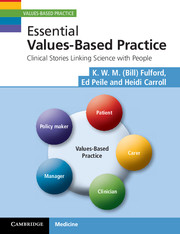Book contents
- Frontmatter
- Review quotes
- Contents
- Foreword
- Acknowledgements
- A bold claim to start this book
- Prologue: linking science with people
- Part 1 Values, individuals and an overview of values-based practice
- Part 2 The clinical skills for values-based practice
- Part 3 Relationships in values-based practice
- Part 4 Science and values-based practice
- Part 5 Bringing it all together
- Postcript: the small change of care
- A bold claim to end this book
- Appendix A Values-based practice summary and definitions of key terms
- Appendix B Values-based practice teaching framework
- Index
Part 2 - The clinical skills for values-based practice
Published online by Cambridge University Press: 05 June 2012
- Frontmatter
- Review quotes
- Contents
- Foreword
- Acknowledgements
- A bold claim to start this book
- Prologue: linking science with people
- Part 1 Values, individuals and an overview of values-based practice
- Part 2 The clinical skills for values-based practice
- Part 3 Relationships in values-based practice
- Part 4 Science and values-based practice
- Part 5 Bringing it all together
- Postcript: the small change of care
- A bold claim to end this book
- Appendix A Values-based practice summary and definitions of key terms
- Appendix B Values-based practice teaching framework
- Index
Summary
With Part 2, we come to the first and foundational group of process elements of values-based practice: the four key areas of clinical skills.
Chapter 4 introduces awareness. Without awareness of values and of the often-surprising diversity of values, none of the other process elements of values-based practice can get any purchase. In this chapter, the story of how a young woman, Sally Coombs, reaches a turning point towards recovery from schizophrenia illustrates the importance of raised awareness of values as the basis of effective clinical care. Later chapters will illustrate the importance also of developing tools for self-awareness.
Chapter 5 describes reasoning. In Chapter 2, Dr. Gulati applied “top-down” principles reasoning in trying to work out what to do about Roy Walker's demand for an off-work certificate. This chapter shows how “bottom-up” case-based reasoning (sometimes called casuistry) helped a different GP, Dr. Charles Mangate, in managing a case of teenage acne.
Chapter 6 discusses knowledge. This chapter focuses the narrative primarily on knowledge of values for training and research. It shows, through the story of a nurse practitioner, Trish Butler, and her patient, Sandy Fraser, with chronic obstructive pulmonary disease, what we can learn but also what we cannot learn about values by searching electronic databases.
Chapter 7 describes communication skills. Where Chapter 6 focused on training and research, this chapter brings us back to the challenges of clinical work. Through the story of a teenager, Vicky Bartlett, with type I diabetes, it illustrates the importance of communication skills, particularly for eliciting values and in conflict resolution.
- Type
- Chapter
- Information
- Essential Values-Based PracticeClinical Stories Linking Science with People, pp. 37 - 38Publisher: Cambridge University PressPrint publication year: 2012



